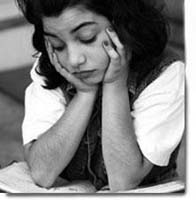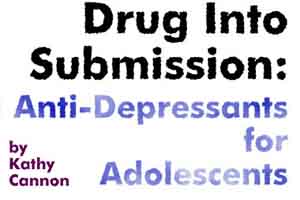Issue Archives
Music Reviews
About IMPACT
Advertise in IMPACT
E-Mail Us
Join the Mailing List
Subscribe to IMPACT
Links
Staff
Wanna Write for IMPACT?
Where to Find IMPACT
Home


School has been in session for weeks now, and students in kindergarten through twelfth grade around the nation can expect at least one visit from their local law enforcement agency promoting Drug Abuse Resistance Education, also known as "D.A.R.E." The trained education officers attempt to give children the skills they need to avoid drug involvement. Kids learn catchy phrases like "Just say no" to respond to the enticements of sleazy street corner drug pushers. Who would've thought this same phrase would come in handy during routine office visits with their friendly family physician?
The cases of depression in children have increased dramatically, and physicians now prescribe medication for them at alarming rates. About 600,000 kids take antidepressants -- even though these personality-altering drugs have not been approved for use in children by the FDA.
Children's use of antidepressants is expected to skyrocket as money-hungry drug manufacturers seek FDA approval to market their pills to children. Peppermint-flavored Prozac is already available, and manufacturers eagerly await their chance to push it on kids.
"It's part of the human condition to feel crummy if something bad is happening in one's life. But that's very different from having a clinical disorder."-- Harold Koplewicz, Vice Chairman of Psychiatry, New York University Medical Center Clinical depression differs from feeling sad, down, or blue; it is pervasive and long-lasting, and can even be life threatening. Clinical depression, caused by chemical imbalances and improper nerve impulses in the brain, does not depend on events or situations in a child's life. Statistics indicate that about 5% of children are depressed, and even more children may suffer from "borderline" depression. Experts claim that depression is "under-diagnosed" and the figures for depression are actually low.
Since there are no tests given which can positively determine if an individual has clinical depression, diagnosis -- especially in borderline cases -- is difficult. Diagnosis is even more difficult in children than adults, as their depression can take different forms. Kids also have difficulty expressing their feelings and conveying their symptoms, which can impede diagnosis. Additionally, depression can be mistaken for other disorders, such as attention deficit hyperactivity disorder (ADHD), conduct disorder and schizophrenia. ADHD and depression have many similar symptoms, such as inattentiveness, impulsive behavior, and hyperactivity.
"If it's hard to function, but not impossible, that's not a good enough reason to prescribe a personality-altering drug." -- An Orlando area pediatrician Physicians look for other signs that might indicate depression, including a dislike for activities that used to be enjoyable, irritability, boredom, low energy, complaints of physical illness, absences from school and poor academic performance. However, these "warning" signs describe a typical teenager. Adolescents exhibiting these behaviors can easily be misdiagnosed as depressed teens. Can't teenagers behave like adolescents without being labeled by adults as depressed?
Pressured by insurance companies to reduce medical claims, primary care physicians are urged to perform this complex diagnosis and treatment themselves, rather than refer the child to a more qualified, yet more expensive, mental health care specialist. Psychiatric evaluations aren't necessary; a "depressed" child is diagnosed by a physician and prescribed an antidepressant -- without therapy. Both insurance company and doctor benefit financially -- medical costs are reduced for the insurer, and physicians benefit through follow-up visits to evaluate response to the medication.
"Ruth Musicante of Silver Spring, Md., says her 6 year old son, diagnosed a few months ago with depression ... had a severe reaction to Paxil after trying it for only 10 days. 'It took away his impulse control, causing him to run in front of cars in the street and to attack a baby sitter he has known for 5 years, drawing blood by scratching and biting him."-- Beth Brophy, Online U.S. News
Paxil, Prozac, and Zoloft are a "new generation" of antidepressants known as serotonin-re-uptake inhibitors (SRRIs), which have general approval for use in adults. Once a drug has general approval by the FDA, physicians can prescribe it to anyone for any reason. Hoping to gain FDA approval and ultimately a bigger market, SRRI manufacturers are conducting studies and submitting their research on the effects on children.
"There are so many forces pushing us to accelerate the use of antidepressants for children. But we need to slow down...We don't have a good body of research yet about how antidepressants will affect them long term." -- Michael Faenza, President/CEO of the National Mental Heath Association
Proponents of SRRIs claim that these drugs have "fewer side effects" than other antidepressants, so health professionals don't have to consistently monitor the heart or blood levels. Also, Prozac's "convenient" one-pill-a-day dosage has almost no risk of overdose. However, side effects do occur with these drugs. Eli Lilly, manufacturer of Prozac, reports that frequent short term side effects might include increased appetite, nausea, vomiting, weight gain, agitation, amnesia, confusion, emotional changes, or sleep disorder. SRRIs may take up to four weeks for the full effect to materialize. Some drugs are ineffective, while others may cause an adverse reaction, dictating a change in medication. Discontinuation of these drugs can cause insomnia, nausea, or nervousness. Worst of all, their long term effects are still unknown.
"If we teach our children that pills will make them feel better, how can we then tell them not to try a joint or a few drinks to lift their spirits?" -- Arianna Huffington, nationally syndicated columnist
Mood-altering drugs, whether prescribed or sold on the street, affect our thoughts and actions. By prescribing antidepressants to remedy life's problems, parents, educators and health professionals fail to teach our children proper coping mechanisms, and instead teach them to depend on drugs to feel better. How will a teen differentiate between the good feelings from the antidepressants, and the same feeling from marijuana or some other illegal drug? This sends a mixed message to our children -- you can use drugs to make you feel better, as long as they're prescribed.
"Depressed adolescents may abuse alcohol or other drugs as a way to feel better" -- Center for Adolescent Health Fact Sheets
Childhood is generally thought of as a carefree period in one's life. Children aren't "supposed to be" depressed -- it's not "normal." Years ago, specialists determined that children are not "supposed to be" inattentive or hyperactive. Doctors prescribed Ritalin to change their actions and behavior -- molding them into a "perfectly normal child" -- one that is not inattentive or hyperactive. Now, it's Prozac, Zoloft or Paxil -- the "newest" personality-altering drugs. A teen diagnosed as "borderline depressed" instantly becomes an exception -- not "normal" -- "needing" medication to regulate thoughts and feelings.
What is normal? People act and react differently, depending on their personality -- a complex combination of physical, psychological, and emotional responses, which varies depending on the person and their age. With more to be discovered about the brain and how it functions, it is pointless to set standards for "normal" reactions to life's problems for anyone, let alone children who are experiencing tremendous physical and psychological changes on a daily basis. Changing who they are through a drug doesn't solve the real problem.
Drugging children to make them "normal" is also an attempt to make them more manageable. Our expectations of children's behavior have become unrealistic; at the same time, our parenting and education are less effective. We expect kids to be capable of adult behavior, even though they're not taught what's appropriate and what isn't. When they're not behaving according to these expectations, they're not just being kids -- they're unmanageable and uncontrollable -- so "something must be wrong with them." A child doesn't have a difficult life or a lousy home environment, he has a chemical imbalance. Another isn't doing poorly because of a lack of ability, an incapable teacher, or an overcrowded classroom, she has a medical condition. Parents won't feel guilty for being lousy parents or for contributing to their child's problems, and educators won't be liable for the student's academic problems. Blaming chemicals or a "condition" for an inability to cope masks the real problems and allows them to continue without change.
"If we think they [children] can't cope without a pill, they will grow up believing that." -- Arianna Huffington
A real change in behavior and attitudes takes time and effort, sometimes requiring months of expensive psychotherapy. A society that values immediate gratification chooses drugs instead as a quick fix. Antidepressants are the fast, easy, economical way of controlling thoughts and behavior. What could be more simple and convenient than one Prozac a day? Within 30 days, lazy parents can literally be the proud owner of a "brand new child" -- with less hassles, less time and less money. Parents can exchange the frustrations and challenges of parenting for a cheap bottle of pills.
In a recent study by the Geisinger Health System, physicians investigated depression and found that children adapt to stressful situations just like their parents do. They concluded that children can be conditioned to act depressed, learning inappropriate coping skills. Experts fear that with inter-generational learning, depression may spiral out of control. Teaching them that pills are the solution to their troubles contributes to this dilemma.
In Aldous Huxley's novel, Brave New World, the solutions to social problems are government-engineered, quick, easy, and cheap. Citizens stay perpetually happy, thanks to "soma," a magical drug that keeps them from ever having to feel bad about their problems. It's time we face reality and end the cycle of blaming others for our problems while looking for quick, easy solutions. We need to learn to accept others as they are, not as we think they should be. We need to learn coping skills and effective, long-term life strategies. If we are to create a true "brave new world" in which humanity can thrive, we must learn to do it soma-free.
Very special thanks to Morris Sullivan
Back to October/November '97 Issue